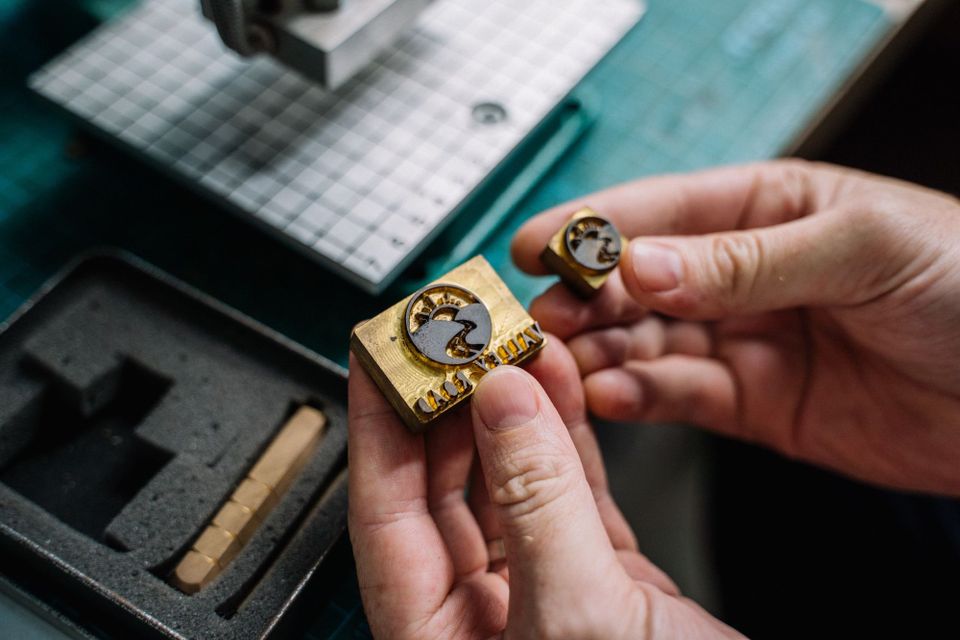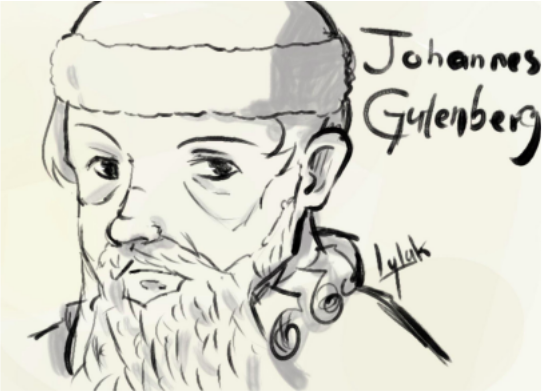The Printing Press

From hundreds of thousand years ago to the year 1440, writing was always done by hand. Each letter, each paragraph was all done by hand and it was an exhausting job to do, until one day, a man called Johannes Gutenberg changed it all. He was the inventor of the first moving printing press, making the process itself of sharing information, easier and less time consuming.
Back in the year 1395, there was a boy named Johannes that was born in Mainz, Electorate of Mainz, in the Holy Roman Empire. Nobody, not even his parents or friends thought that his name was going to be known worldwide. Johannes Gutenberg is the man who invented the printing press, a moving machine that allows you to put ink on a smooth surface and when that surface of ink is pressed above another surface with great pressure, the ink will be transferred and it will leave a mark. This is called printing, thus the name of the machine, “The printing press”. His invention marked the beginning of the printing evolution. Johannes Gutenberg’s father, Friele Gensfleisch was a merchant, also a goldsmith. His mother, Else Wyrich came from a merchant family. Those might have been one of the reasons Johannes became a goldsmith along with being an inventor.
Johannes was always fascinated with machines, especially the ones that move with their own mechanisms. His idea to make the printing press developed from him observing various machines, varying from ones that used mechanisms and ones that didn’t, and taking ideas from other inventors merging it all into one big idea. As Johannes was a goldsmith like his father and familiar with crafting, he started out with simple scraps of metal and wood for his invention. He began working on it during the year 1440, experimenting and testing on his machine and 10 years later, his invention became a success. With his invention, he could print poems, stories and even bibles. The bible, named “Gutenberg Bible” was one of the first books to be mass printed in Latin using the first printing press and is still known today. He was already familiar with bookmaking, so his process in printing the pages, making the cover and putting it all together wasn’t as arduous as making his invention.
But before Johannes started working on his invention, he and his family were exiled from his hometown, Maiz, because they revolted against the noble class ruling the town. Johannes remained in Strasbourg, France, before returning to his home country proud of his time changing invention.
The reason why his invention is so important is that it saves time, and it is easier than having to write everything by hand. The printing press allows us to print information significantly faster and with many copies of the same writing, many people can access it. It is a very important invention in history.
Johannes' invention isn’t the first invention that printed books, as China had book printing since the 11th century. But his invention of printing books was the first with individual parts with different roles. Because of that, it is easier and faster to use. As the inventor he is, he didn’t just stop after making the printing press, he also invented a technique that can polish gems, and also contributed to the making of mirrors, which was successful in 1835.
Later on in his life, he became old, senile and his health declined steadily. Despite making a worldwide known invention, he fell into poverty and due to the lack of medical resources, he inevitably passed away in the year 1468, February 3, due to unknown reasons. It was recorded that in his few months living, he went blind. There was no record of him starting a family, or getting married. But there is some evidence that he was supposed to marry a woman called Ennelin.

References
https://en.wikipedia.org/wiki/Johannes_Gutenberg
https://www.biography.com/inventor/johannes-gutenberg
https://www.britannica.com/biography/Johannes-Gutenberg
Author biography
Lylak Ilyas Mohamed is 14 years old, and is a participant in the prestigious Leaders of Tomorrow programme run theCircle by the Ugail Foundation. Lylak enjoys reading supernatural mystery books and also doing art. Currently, she is very interested in psychology, music and learning other languages.

Cite this article as:
Lylak Ilyas Mohamed, The Printing Press, theCircle Composition, Volume 1, (2021). https://thecirclecomposition.org/the-printing-press/
